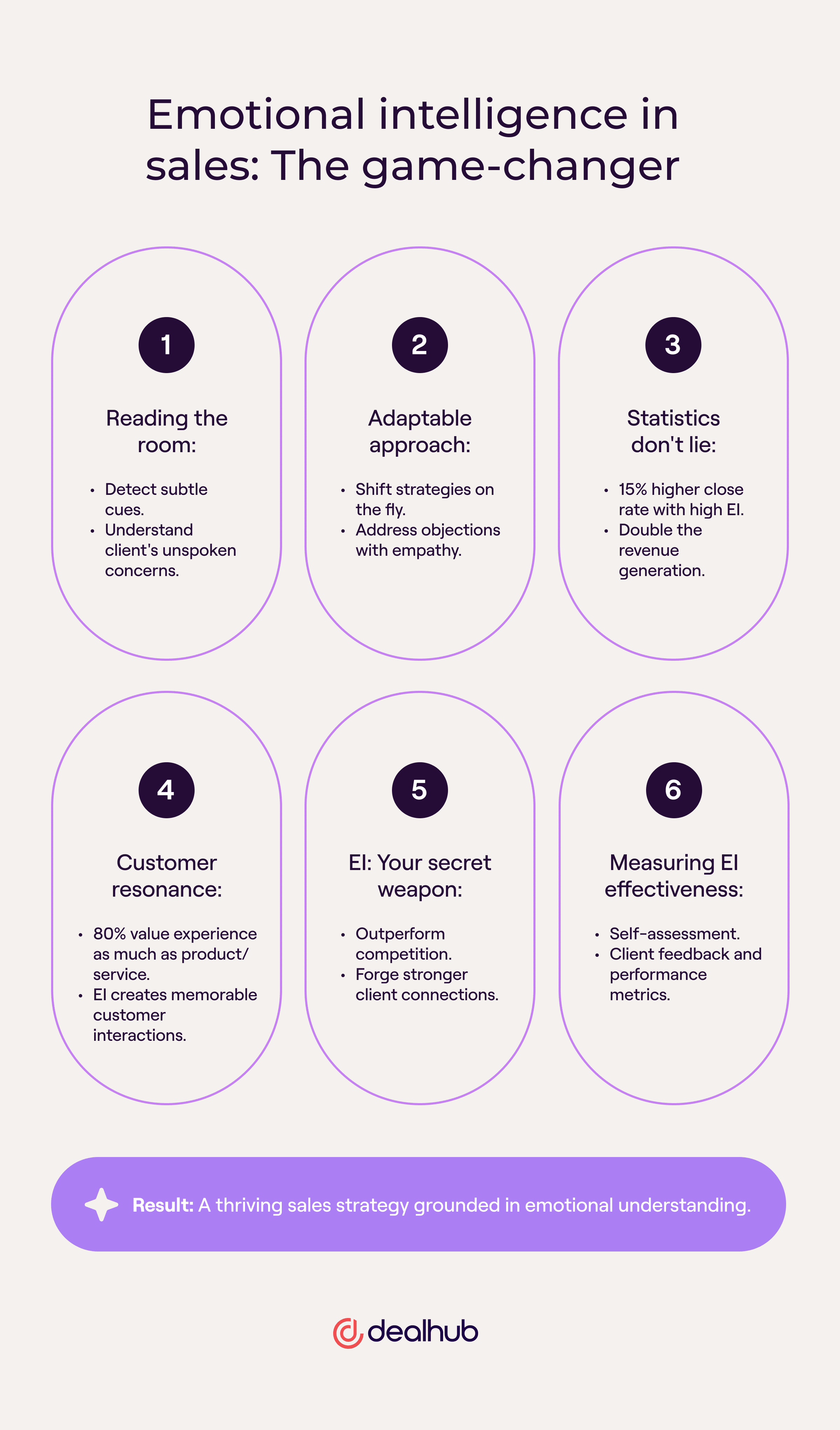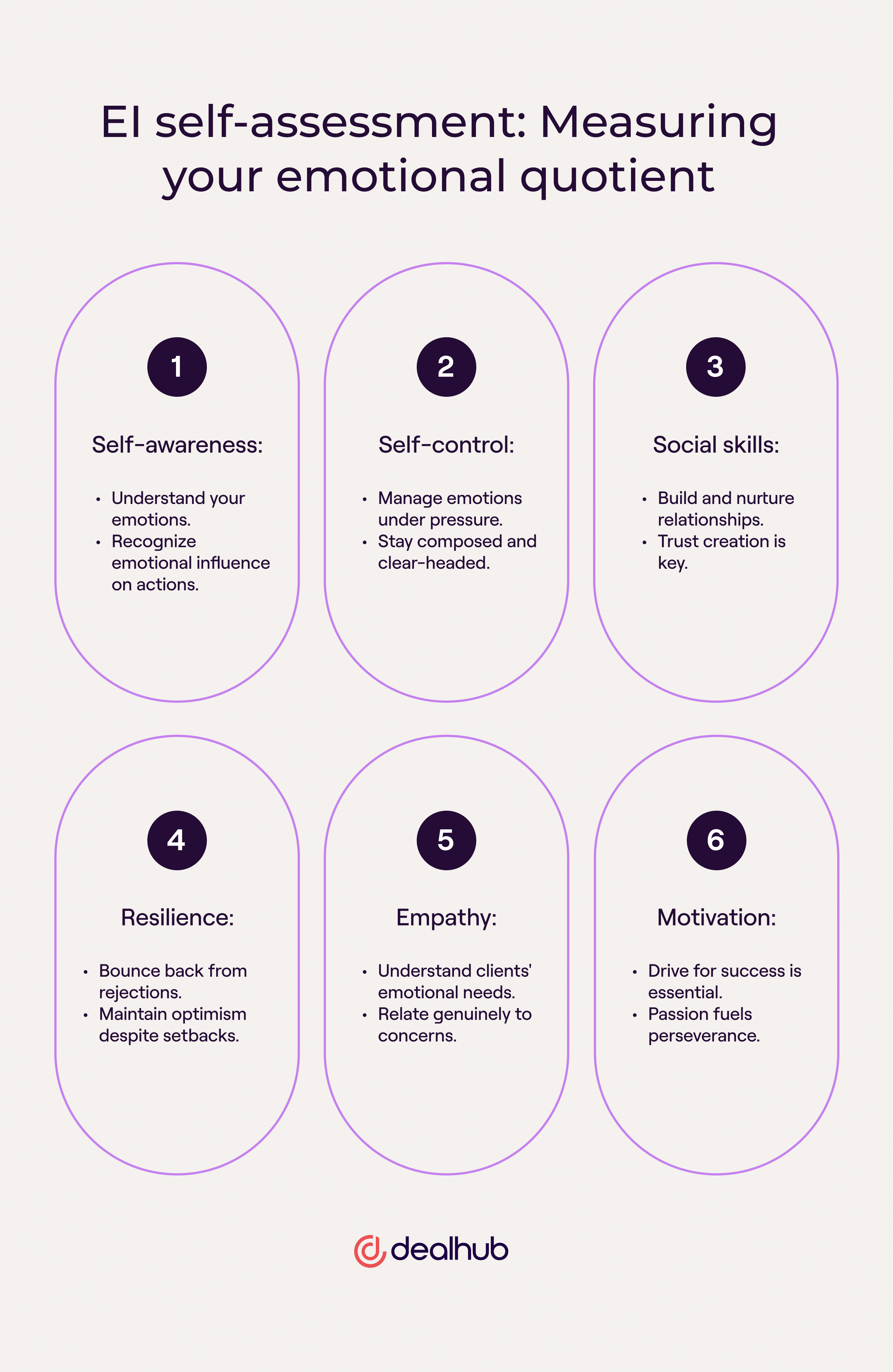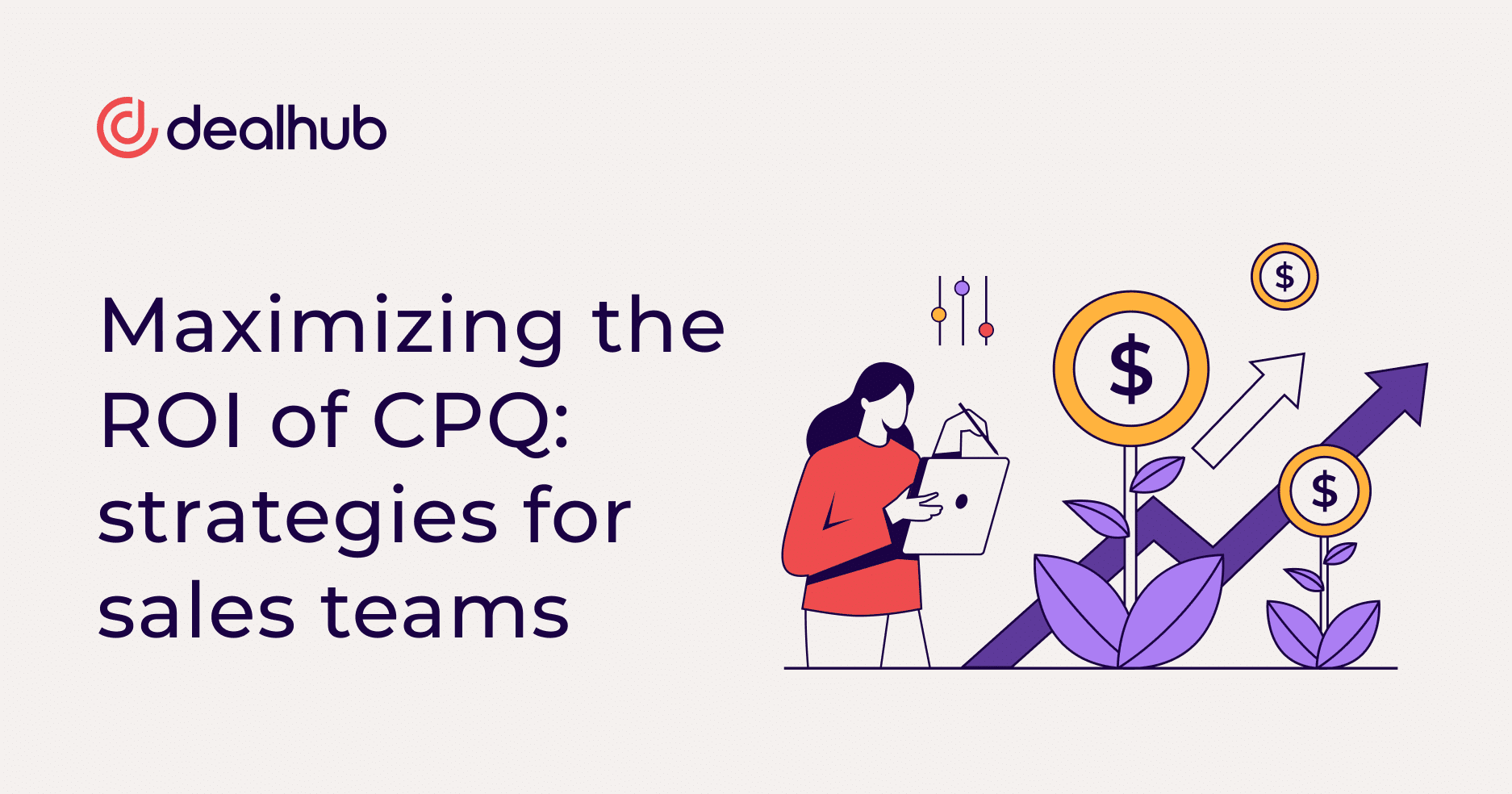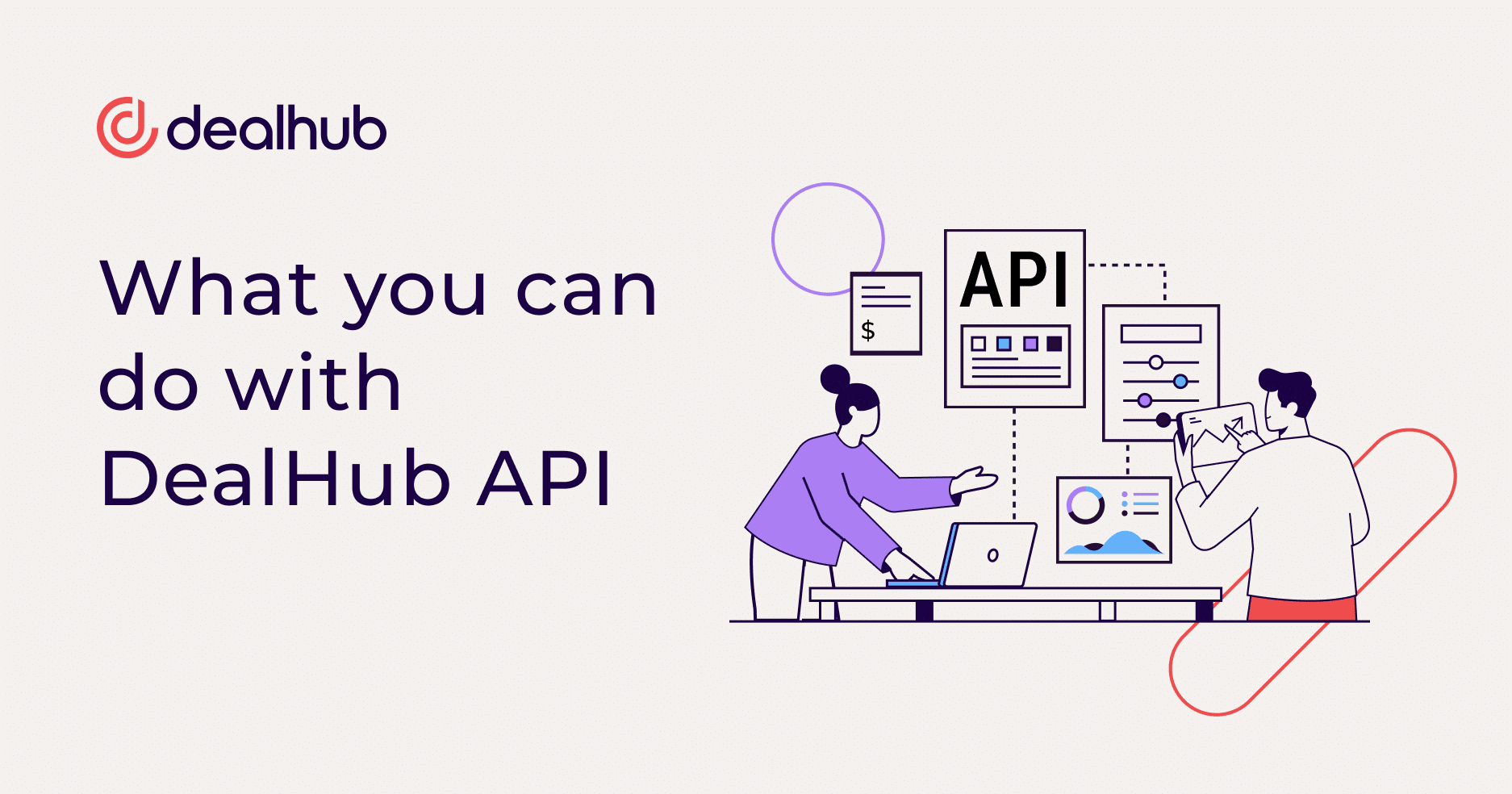In this article, we’ll explore EI’s pivotal role in sealing deals, building lasting client relationships, and navigating the challenging terrain of sales objections. It’s not just about what you’re selling – it’s how attuned you are to your client’s needs, desires, and unspoken reservations.
So join us as we discover the fundamentals of emotional intelligence and unravel its profound impact on sales efficacy. Learn actionable strategies to enhance your empathy, self-awareness, and interpersonal skills – all critical ingredients in the complex recipe of sales success.
The business of selling should emphasize (and prioritize) the human element. Let’s jump in and explore the transformative power of emotional intelligence in sales!
Emotional intelligence: the hallmark of professional success
More than any other profession, sales revolves around understanding and connecting with people. While you might have the best product or service in the world, if you can’t relate to your clients on a human level, your product will never get the recognition it deserves. That’s why it’s essential to marry product and industry knowledge with a human touch that will engage your audience and build a level of trust that can’t be maintained with data points alone.
Why is emotional intelligence crucial in sales?

Imagine this: You’re meeting a potential client, and you instantly notice their hesitation. They’re not saying it outright, but something’s bothering them. A salesperson lacking in EI might bulldoze forward, pushing the sale without addressing those unspoken concerns. On the other hand, someone with high emotional intelligence in sales would pick up on these subtle cues and adapt their approach. They would ask questions, listen actively, and provide solutions that genuinely meet the client’s needs while addressing objections head-on.
The statistics back this up. Salespeople with high EI have a 15% higher close rate. Revenue also shows a marked improvement, with high EI salespeople delivering 2X more revenue. More than that, emotional intelligence resonates with customers. According to Salesforce, a whopping 80% of clients found the experience a company provided was as important as its product or service offering itself.
The message is clear: emotional intelligence is your secret weapon if you want to succeed in sales. But how do you gauge just how effective you are at mastering EI in sales?
EI self-assessment
Before we break down strategies for developing emotional intelligence, it’s essential to assess your current level of EI. Here are some key questions to ask yourself:

Self-awareness: Are you in touch with your emotions? Can you recognize how your feelings influence your actions and decisions?
Self-control: How well do you manage your emotions, especially in high-pressure sales scenarios?
Social skills: Are you adept at building relationships, establishing trust, and fostering client connections?
Resilience: How do you bounce back from rejections and setbacks in your sales journey?
Empathy: Can you genuinely understand and relate to your clients’ emotions and perspectives?
Motivation: Are you driven to succeed and passionate about what you do?
Take a moment to self-reflect and rate yourself on these aspects. Remember, it’s okay to have areas that need improvement; we’re all works in progress!
Strategies for developing emotional intelligence
Once you’ve gaged your level of EI, you’ll have a better idea of areas in which to improve. Luckily, there are endless strategies for enhancing these critical EI skills in the context of sales performance. Based on the areas of improvement you noted above, you may want to focus on:
1. Self-awareness and self-regulation
EI requires self-reflection. Sales professionals should regularly reflect on their own emotions and reactions to various situations during the sales process. After a difficult call, for example, assess your strengths and weaknesses. This practice can pinpoint areas that need improvement.
Adopt techniques like deep breathing, meditation, or exercise to manage stress in high-pressure sales situations. During sales calls, remember to think before reacting, in order to make more rational decisions.
2. Empathy
Those with high levels of emotional intelligence have highly developed listening skills. Practice listening to customers without interrupting and truly understanding their needs. Put yourself in your customer’s shoes during sales calls. This will put you in a headspace to better comprehend the client’s feelings and motivations.
3. Social and communication skills
Modern sales is all about relationship building. Sales leaders can provide training on building rapport, trust, and long-term relationships with clients.
As a salesperson, take advantage of any training or mentorship on offer. You can also practice clear, concise communication during your calls. Do this by asking clarifying questions to clients. Take feedback and constructive criticism, whether from clients or managers, in stride and practice conflict resolution. You can do this by considering your customer’s concerns and strategizing with them to develop a win-win scenario.
4. Recognizing and managing emotions in others
Humans often communicate via non-verbal cues. As a sales professional, you can learn to become adept at reading facial expressions, body language, and tone of voice to understand the emotions of others.
Adjust your approach based on the emotional cues you begin to observe in clients.
5. Role-playing and scenario training
Role-playing exercises can simulate real sales situations, allowing sales professionals to practice applying emotional intelligence techniques. Try role-playing with colleagues or team members to ensure you have built the confidence to rise to any situation a client might throw at you.
6. Coaching and mentoring
Teaming up with mentors is a great way to build on your emotional intelligence. Ask for coaching or seek the mentorship of seasoned sales leaders who possess strong emotional intelligence and can provide sound guidance.
7. Continuous learning via feedback and self-improvement
Just as the latest technologies and sales strategies are constantly evolving, so is knowledge of EI. Stay updated on emotional intelligence research and trends by attending workshops or seminars on EI in sales. You can also measure your progress by soliciting feedback from mentors, colleagues, and managers and revisiting the above EI self-assessment from time to time to work on areas for self-improvement.
8. Mindfulness and self-care
Effective use of EI requires sales representatives to stay in touch with their emotional well-being. Managing emotions and managing expectations can prevent burnout, while a supportive environment promotes perpetual personal growth. The most effective sales leaders create an environment that enables individuals to juggle professional growth while being mindful and embracing self-care.
Never forget: developing emotional intelligence is an ongoing process that takes time and patience. Consistent practice and a commitment to personal growth are vital to becoming a more emotionally intelligent sales professional.
To sell is to be human
At the end of the day, the essence of sales is profoundly human. It’s all about learning from others, developing relationships, having conversations, and meeting other people’s needs. While the sales landscape has evolved to include more technology, such as AI, automation, and data-driven approaches, the human element remains the driving force behind a company’s success.
With practice and continual reinforcement, salespeople can approach their sales role with high emotional intelligence. After all, modern sales is not just about selling a product or service; it’s about understanding, connecting, and genuinely catering to your clients by putting them at the center of the buying experience.
So, as you continue to grow your sales acumen and work to continuously evolve within a fast-moving marketplace, remember the power of emotional intelligence. It’s not just a professional skill; it’s a level of mastery that can transform your career and your relationships.









